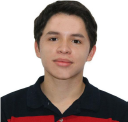 Diego Manrique – Guatemala
Diego Manrique – Guatemala
Putting diversity to work to find solutions locally and globally
At age thirteen, Diego Manrique took stock of his country and his role in it. Middle school teaching methods were more interactive than those in his grammar school’s structure, and he enjoyed participating. He realized that classmates liked what he had to say, so he decided he should use his influence to accomplish positive ends. His main interest at the time was climate change, and he joined Propuesta Urgana Joven, an NGO focusing on recycling and environmental protection. For three years, Diego served as a volunteer coordinator and advisor for social and environmental initiatives that included raising awareness. Lack of trash and waste infrastructure created disasters, such as the pollution of Lake Atitlán, once designated by National Geographic as the most beautiful lake in the world. The wondrous rain and cloud forests were shrinking, threatening biodiversity and endangering the colorful quetzal bird, a symbol of Guatemala itself, and other endemic species.
Upon graduation from high school, Diego had earned an “Outstanding and Perseverant Student Award.” When he attended the Universidad de San Carlos de Guatemala, majoring in political science and international relations, his interests branched out considerably from running and swimming, cooking and baking, to Chinese and German language studies, and terrorism and counterterrorism. He also volunteered as a teaching assistant in a French class.
Diego’s many multicultural interests led him to “one of his greatest experiences so far.” In July of 2015, he packed his bag for Paris, France to attend the International Leaders, Human Rights, and Environment Summit hosted by LabCitoyen. Partly because he speaks French and partly due to his efforts with the NGO on behalf of the environment, the French embassy in Guatemala City selected him as the Guatemalan representative and asked that he address the assembly. His speech stressed that leadership is a set of skills that are flexible and can be learned. He also focused on appreciating diversity as “a tool to achieve our goals and fight the unexpected.” Diego loved getting to know people from all over the world and learning about climate change, but he also enjoyed the introduction to French culture, live international relations, and European politics. He also discovered that his appreciation of diversity and multiculturalism had deepened into a passion.
A month later, he found himself in San José, Costa Rica at the Political Science Congress for Central America. That same August he became the head delegate for the National Model UN. Diego also began a yearlong stint with his university’s Political Science Debate Society and served as its human resources director. After joining the Political Science Students’ Association, he became the president of its consulting committee.
In late March of 2016, he was off to New York City to participate in the model UN simulations. Another trip in July took him to Montreal, Canada for his “second greatest experience,” the Forum des Jeunnes Ambassadeurs de la Francophonie des Amériques. He was selected as the Guatemalan ambassador for a forum held in French on leadership and multiculturality. Participants came from all over the American continent, including the Caribbean. Diego says he learned more about the basics of leadership and cross-cultural understanding as they relate to the French-speaking community worldwide. A final trip that year brought him to Bogotá, Colombia for a “Hackathon” with the Institut Français. This was an intensive 36-hour “tech and innovation marathon” in which participants brainstorm to devise a potential solution for a specific topic or issue. “In my case we came up with a platform to share different human rights initiatives and issues worldwide. My group was the winner of that particular event.”
Diego has put his talents, his ideas, and his array of experiences—including those baking classes—into an award-winning concept to help the poorest people in Guatemala, once proud Mayans who splintered into ethnic groups speaking 23 different languages. Historically enslaved by Spanish conquistadores, brutally repressed by agents of the United Fruit Company, beaten down, raped, and massacred by leaders charged with genocide, rural Guatemalans still work the land for minimal wages. A restricted diet contributes to high malnutrition rates, which is the main cause of children dropping out of school. Yet a cookie project may bring help, because it aims to help “make a meal a God-given right.”
Iron and vitamin A are especially deficient in the diets throughout the Salamá area of Guatemala. Diego has developed a cookie with a day’s supply of these two vital nutrients for children between five and ten years of age. The promise of even one cookie is enough to help increase both enrollment and attendance rates, which can have a positive impact in a child´s life and in the fight against poverty. For every cookie sold for a dollar in Guatemala City, a second cookie will be supplied to a school child, along with nutritional outreach programs. The Hansen Foundation award carried $500 in seed money.
Though Guatemala has achieved one of the fastest growing economies, poverty is still rising, and its people face many problems as they work toward economic stability and democracy. “I am driven to find solutions,” Diego says, “and I am now aware of the potential that I have as an individual to influence my surroundings and other people in order to transform conflict into real long-term solutions.” He also hopes to work internationally. “I envision my role in creating international cooperation and a more peaceful world as an ambassador of humanity, leadership, scientific, and social principles that can guarantee a peaceful cooperation and a more united world.”
